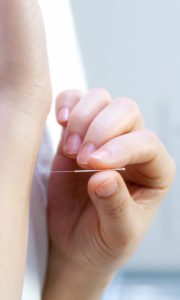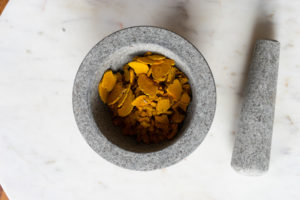WHY AUTOIMMUNE SUFFERERS
Are Turning To TCM

Autoimmune disorders are on the rise at an alarming rate with roughly 50 million Americans suffering from these disorders. Since scientists haven’t figured out what actually causes most of them, prevention of them isn’t possible and currently available treatment options can lead sufferers wishing for better solutions.
If you’re like most people with autoimmune disorders, you likely suffered for years before getting a diagnosis. Once you had a name for what you’ve got, you likely start on some course of prescription medication but found that you still don’t feel like your old self. The complex problem of autoimmune disorders requires a more complex solution than conventional medicine provides. Taking medication to suppress the immune system only temporarily alleviates the symptoms. That’s basically like putting a bandaid on a gunshot wound. It’s not going to do much to solve or reduce the bigger problem. That’s why autoimmune sufferers are looking for better options.
Eastern medicine takes a different approach. According to TCM (Traditional Chinese Medicine), autoimmune disorders happen when there’s an imbalance in the body, either an excess or deficiency or both in different areas. TCM takes into account the individuality of each autoimmune sufferer and provides a personalized, holistic diagnosis to correct the underlying issue, rather than just the symptoms. If you’re looking for a personalized diagnosis and solution, consider scheduling a virtual consultation with one of our Eastern medicine experts so they can listen to your concerns and goals and help come up with a custom wellness plan.
Survey says…
 A number of studies have documented that acupuncture causes positive physiological changes in the body within the nervous system, the immune system, the brain, circulation, and it can help reduce inflammation. It provides relief for pain and can help manage the symptoms which overall, can improve the quality of life for autoimmune sufferers. Acupuncture is an effective treatment for pain caused by systemic lupus erythematosus (SLE). These positive results were shown in the 2008 study ‘Acupuncture for Systemic Lupus Erythematosus: A pilot study RCT feasibility and safety study’ which assessed the safety and effectiveness of acupuncture as a means to treat pain associated with lupus.
A number of studies have documented that acupuncture causes positive physiological changes in the body within the nervous system, the immune system, the brain, circulation, and it can help reduce inflammation. It provides relief for pain and can help manage the symptoms which overall, can improve the quality of life for autoimmune sufferers. Acupuncture is an effective treatment for pain caused by systemic lupus erythematosus (SLE). These positive results were shown in the 2008 study ‘Acupuncture for Systemic Lupus Erythematosus: A pilot study RCT feasibility and safety study’ which assessed the safety and effectiveness of acupuncture as a means to treat pain associated with lupus.
At the end of the trial, 40% of the patients in both the standard acupuncture treatment group and the minimal needling group experienced an improvement in their pain levels of at least 30%. However, the group that remained on their usual care plan reported no improvement in their pain levels. The study concluded that acupuncture is a valid, safe, and effective method to treat pain in patients with SLE.
Acupuncture has also been shown to help Raynaud’s Syndrome sufferers. In a 2003 study, participants reported a 63% improvement in attacks during the 23 weeks.
In addition to pain relief, acupuncture is known to balance the immune system. In TCM, your immune system is considered to be a protective shield for your body. It’s fueled by your body’s energy stores, so when you’re stressed or run down, your immune system can become weakened which makes autoimmune sufferers more likely to have a flare up.
Pass the herbs, please.
 If you have an autoimmune disease it is important to avoid immune stimulants like echinacea because they can agitate out-of-control immune responses. An immune modulator like astragalus or turmeric or an adaptogen like American ginseng might do better. But there is a wide range of responses to these herbs, so trial and error is part of the process. (Darn!)
If you have an autoimmune disease it is important to avoid immune stimulants like echinacea because they can agitate out-of-control immune responses. An immune modulator like astragalus or turmeric or an adaptogen like American ginseng might do better. But there is a wide range of responses to these herbs, so trial and error is part of the process. (Darn!)
Certain herbs can be used to treat autoimmune disorders. A few of those are:
- Sarsaparilla has been thought to treat autoimmune diseases by purifying the blood and reducing joint and muscle inflammation.
- Gentiana macrophyllae has been used for centuries to treat systemic lupus erythematosus (SLE) in people who “run hot”
- Artemesia anomala aka Sweet Annie or Sweet Wormwood is used for heat or inflammatory conditions which get worse in the summer months.
- Reishi Mushroom is listed in ancient Chinese medical texts as an immune modulator with calming, pain-relieving action, which “tonifies the blood”.
- Turmeric has powerful anti-inflammatory properties.
Note that autoimmune disease is a combination of excess immune activities and underperforming responses. So neither suppressing the immune response as western medicine does with steroids nor boosting it herbally, say with echinacea, addresses the balance completely. Adaptogens or immune modulators, not immune tonics should, therefore, be part of the mix.
Your TCM practitioner can provide herbal treatments that are specific to your needs. Very often there is an underlying Kidney yin deficiency that can be addressed with herbal formulas like Liu Wei Di Huang Wan. In the meantime, a bit of marshmallow root or slippery elm in your water bottle can give your yin a boost.
Diet
 The first step in dealing with most autoimmune disease is to identify dietary triggers. Whether there is a genetic component as in lupus, an infectious trigger as in MS, or an intestinal onset, many AI flares can be triggered by the combination of food sensitivities and leaky gut. Once intestinal “good bacteria” are cut down by antibiotics or lifestyle, the tight junctions in the gut wall can break down and proteins that are not supposed to get into the body leak through and create havoc . Dr. Marios Hadjivassiliou found that when the cause of a neurological disease is unknown (not due to trauma or genetics), the percentage of those patients with elevated antibodies to gluten is 57%. This covers a lot of autoimmune diseases.
The first step in dealing with most autoimmune disease is to identify dietary triggers. Whether there is a genetic component as in lupus, an infectious trigger as in MS, or an intestinal onset, many AI flares can be triggered by the combination of food sensitivities and leaky gut. Once intestinal “good bacteria” are cut down by antibiotics or lifestyle, the tight junctions in the gut wall can break down and proteins that are not supposed to get into the body leak through and create havoc . Dr. Marios Hadjivassiliou found that when the cause of a neurological disease is unknown (not due to trauma or genetics), the percentage of those patients with elevated antibodies to gluten is 57%. This covers a lot of autoimmune diseases.
The best way to test what you are sensitive to is to go on an elimination diet for a month or two, then to add back potential allergens one at a time, waiting a week each time to see if you have bloating, pain or fuzzy thinking in response. Yes, we know that’s a lot to ask as we all love food, but if in the end you feel better, isn’t it worth it? Gluten, in particular, has the ability to trigger zonulin which opens up intestinal walls, but dairy, soy, citrus, and nightshades like tomatoes and potatoes can also trigger flares. Some will also have food sensitivities to FODMAPS like onions and jicama, so evaluating what might be triggering you is important.
Treat your gut bacteria with food and probiotics to heal any leaking. Food with some fat helps protect the good bacteria down their acid ride through the stomach. Try a variety of plain full-fat yogurts and kefir, miso, olives, blue cheese, sauerkraut and kimchi. If you use probiotic supplements look for a variety of strains – bacteria other than lactobacilli, spore probiotics and prebiotics (bacteria food!).
If you are suffering from an autoimmune disorder, Traditional Chinese Medicine is worth a try. It can help relieve many symptoms and get you on the road to fixing the imbalances that allowed the autoimmunity to develop in the first place.
Newer
Everything You Need To Know About Coronavirus
Older
High Blood Pressure: How Acupuncture & Diet Can Help Naturally
Comments (0)
Leave a reply
You must be logged in to post a comment.




